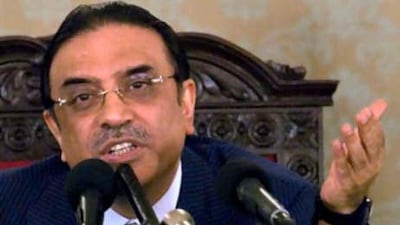ISLAMABAD // Asif Ali Zardari, the widower of Pakistan's first female prime minister, was sworn in as the country's 12th and youngest president yesterday, completing an astounding reversal of fortune. Mr Zardari, 53, who spent 11 years in jail on corruption charges, was elected to the post by MPs on Saturday, making the surprising transition from prison inmate to head of state. It is hoped that his assumption of office will bring about much needed stability to a government that has been rocked by months of political upheaval at a time when the country faces mounting security and economic problems. Since his election, the Pakistani media have been full of speculation over whether Mr Zardari, whose name was a byword for corruption in the 1990s, has become "a reformed character". Editorials mused over whether "leopards can change their spots" or people can "turn over a new leaf". However, few have been able to deny that as a pragmatist, Mr Zardari has played his cards deftly to achieve his goal in becoming Pakistan's most powerful man. He managed to force the country's former military ruler, Pervez Musharraf, to step down as president and has, through sheer brinkmanship and guile, sidelined, perhaps only temporarily, his chief political rival, Nawaz Sharif, a former prime minister. The question immediately on everyone's mind, however, is just how powerful will Mr Zardari be? He controls the presidency, the prime minister's office and his party, the Pakistan People's Party, the party that was led by his wife, Benazir Bhutto, until her assassination in December last year. Ahead of his swearing in, he had pledged to relinquish key presidential powers as part of a broad-based political agreement to devolve power from the presidency to the elected assembly. Those include the power to dismiss the government and assemblies and to appoint military chiefs and governors. It was not clear if he still planned to do that. Mr Zardari has recently reneged on a public pledge to restore the chief justice who was sacked by Mr Musharraf, saying simply that political agreements were "not sacrosanct". However, he has couched the source of his power in western backing. Earlier this week, George W Bush, anointed Mr Zardari as the successor to Mr Musharraf as Washington's key ally in the US-led war on terror. Mr Bush exhorted Pakistan to fight terrorism and said he looked forward to working with Mr Zardari in combating terrorism. Yesterday, Mr Zardari doffed the well-laundered white robes he has worn since his election victory on Saturday and adopted a sombre pinstripe suit. The gravity of his taking oath was underscored by a blast of trumpets that announced his arrival in front of Pakistan's ruling politicians. Mr Zardari pledged to act "honestly" and not to let his "personal interest" sway his presidential judgement. His three children, including the Oxford University student, Bilawal, who is the chairman of the PPP, looked on as Mr Zardari concluded his oath by beaming with a trademark broad smile. Shouts of "Bhutto is alive" rang out across a hall with portraits of Bhutto's father, Zulfiqar Ali, and a pensive-looking Allama Iqbal, Pakistan's ideological-founder and deceased national poet. "It is a very significant day in the history of Pakistan, and it is the victory of the people and the mission of Benazir Bhutto shaheed [martyr]," said Farzana Raja, an aide to Mr Zardari. After taking the oath, Mr Zardari was ferried in a parasol-covered, horse-drawn carriage, flanked by lancer-bearing, mounted cavalrymen, to inspect a guard of honour. He then mounted a podium and, bowing to tradition, touched the feet of his father, Hakim Ali Zardari, the patriarch of a minor Sindhi landowning family. Hamid Karzai, the Afghan president, who sat in the audience, served as a poignant reminder of why Mr Zardari is in power: like Mr Karzai, he is also in office in some good measure due to US and British backing of leaders prepared to take on the Taliban and al Qa'eda. Mr Zardari takes the reins of power as Washington has started a sensitive campaign of making unilateral strikes on terrorist suspects on Pakistani soil. This included its first ground assault last week in Pakistan's tribal areas since 2001, a move that has fanned anti-American sentiment in Pakistan. Mr Zardari has taken on the tough job of assuming "ownership" of the campaign against militants in a country where the majority of its people believe the fight against the extremists is "America's war". Seven militants were killed yesterday in north-western Bajur region. Additionally, six civilians, including three children, died when mortar shells hit two houses overnight in the same region, officials said. It was not clear who fired the mortar rounds. iwilkinson@thenational.ae

Islamabad turns to Zardari for stability
How powerful Bhutto's widower will become remains in question for may in the region.
Most popular today
